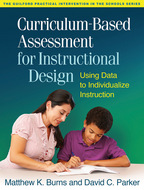Curriculum-Based Assessment for Instructional Design
Using Data to Individualize Instruction
Matthew K. Burns and David C. Parker
Foreword by James A. Tucker
A Paperback Originale-bookprint + e-book
A Paperback Original
orderApril 2, 2014
ISBN 9781462514403
Price: $41.00 158 Pages
Size: 8" x 10½"
The reproducible materials can be downloaded and printed in PDF format.
“The book convincingly demonstrates the benefits of using CBA-ID for assessing and monitoring students' academic performance. The contents are well organized across reading, math, and writing skill areas. In each chapter, the authors insightfully bridge theory and practice to guide educators in making data-based decisions about instruction. This is a valuable resource for practitioners who wish to work effectively and efficiently in multi-tiered systems. I plan to use it as a required text in my Linking Academic Assessment to Intervention course.”

—Laurice Marie Joseph, PhD, School Psychology Program, The Ohio State University
“Burns and Parker explain step by step how school psychologists, instructional coaches and consultants, and teachers can observe student responding during instruction and make instructional changes to enhance learning. This is an ideal text for school psychologists and special educators in training. Each chapter explains the research evidence and the expected effects of particular strategies and provides easy-to-follow case examples to demystify instructional improvements. If you are serious about promoting your students' learning, you will love this book.”

—Amanda M. VanDerHeyden, PhD, Education Research and Consulting,Fairhope, Alabama
“CBA-ID is an authentic assessment tool that can go a long way in promoting instructional success for teachers and academic success for students. Burns and Parker provide a comprehensive overview of the history and research behind CBA-ID, distinguish it from other assessment approaches, and demonstrate its relevance in contemporary schools. The book spells out how to use CBA-ID to assess students’ instructional levels in reading, math, and writing, as well as how to link CBA-ID data to well-matched, research-based interventions. The reproducible (and downloadable) forms will be extremely useful for school-based practitioners and graduate students alike.”

—Daniel Newman, PhD, School Psychology Program, National Louis University
“Finally, a comprehensive, user-friendly guide to CBA-ID. Burns and Parker have created a resource that honors the practice of the legendary founders of CBA, extends the work forward with practical guides, and keeps an eye on the validity and reliability of the methods used. This is a 'must-have' resource for the toolbox of school psychologists and educators interested in assessment for instruction. It will be invaluable for the professional learning efforts I lead as a consultant in our Intermediate School District.”

—Lara Lynne MacQuarrie, PhD, school psychologist, Oakland Schools (Michigan)
—Laurice Marie Joseph, PhD, School Psychology Program, The Ohio State University
“Burns and Parker explain step by step how school psychologists, instructional coaches and consultants, and teachers can observe student responding during instruction and make instructional changes to enhance learning. This is an ideal text for school psychologists and special educators in training. Each chapter explains the research evidence and the expected effects of particular strategies and provides easy-to-follow case examples to demystify instructional improvements. If you are serious about promoting your students' learning, you will love this book.”
—Amanda M. VanDerHeyden, PhD, Education Research and Consulting,Fairhope, Alabama
“CBA-ID is an authentic assessment tool that can go a long way in promoting instructional success for teachers and academic success for students. Burns and Parker provide a comprehensive overview of the history and research behind CBA-ID, distinguish it from other assessment approaches, and demonstrate its relevance in contemporary schools. The book spells out how to use CBA-ID to assess students’ instructional levels in reading, math, and writing, as well as how to link CBA-ID data to well-matched, research-based interventions. The reproducible (and downloadable) forms will be extremely useful for school-based practitioners and graduate students alike.”
—Daniel Newman, PhD, School Psychology Program, National Louis University
“Finally, a comprehensive, user-friendly guide to CBA-ID. Burns and Parker have created a resource that honors the practice of the legendary founders of CBA, extends the work forward with practical guides, and keeps an eye on the validity and reliability of the methods used. This is a 'must-have' resource for the toolbox of school psychologists and educators interested in assessment for instruction. It will be invaluable for the professional learning efforts I lead as a consultant in our Intermediate School District.”
—Lara Lynne MacQuarrie, PhD, school psychologist, Oakland Schools (Michigan)



